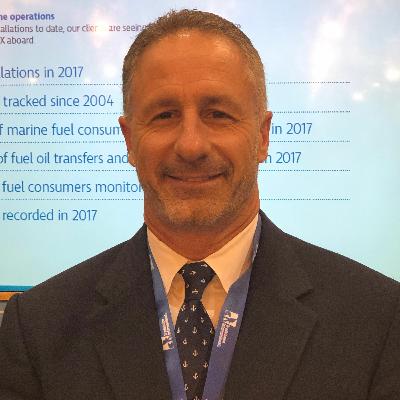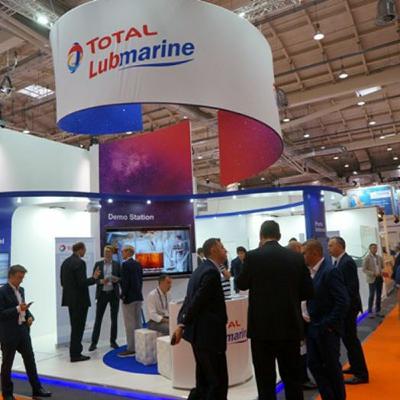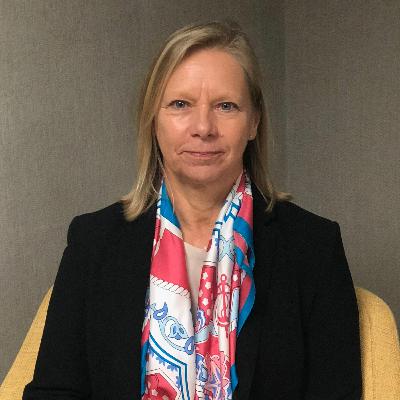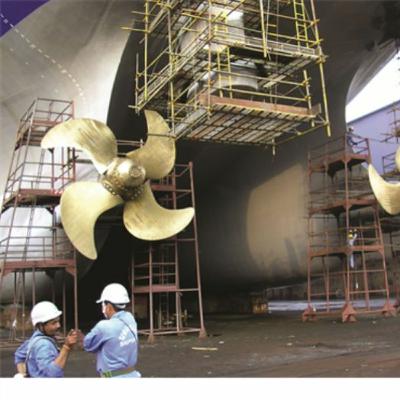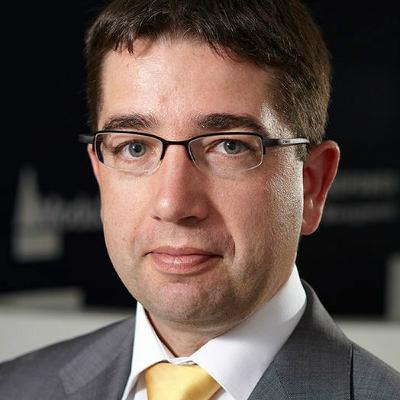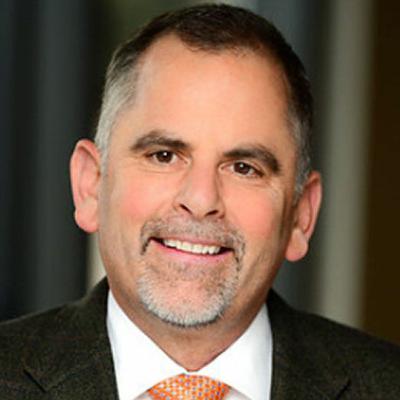Discover Listen Up! powered by Marine Log
Listen Up! powered by Marine Log

16 Episodes
Reverse
Over the last few years, the marine industry has begun to embrace increased digitalization and automation to improve the efficiency of its operations through improved communication, information exchange, analytics, monitoring, and analysis. But this increased interconnectivity also brings with its associated cyber threats. Marine industry owners and operators need to be aware of the proper techniques to assess their risks and mitigate them.
To gain some insight, Marine Log spoke with Elisa Cassi, Lloyd’s Register’s Product Manager for Cyber Security for Marine & Offshore Business. We spoke with Cassi about the state of maritime cyber security and what companies should be doing to mitigate cyber threats.
Now more than ever, vessel operators and charterers are leveraging smart technology and data analytics to reveal operational efficiencies, comply with environmental regulations, and better their bottom lines. This is nothing new to customers of Fueltrax. More than a decade ago, Fueltrax began as a project to help Kirby Inland Marine more accurately measure fuel consumption to improve the efficiency of their vessels. Today, Fueltrax is the leading fuel management solution, installed on over 500 vessels operating worldwide —ranging from small inland tugs to offshore supply vessels to oceangoing tankers.
Marine Log had an opportunity at the recent International Workboat Show to sit down with Anthony George, Founder and CEO of Fueltrax, to discuss how the Fueltrax fuel management system works, what its benefits are to operators, and how he sees the product developing to optimize vessel performance.
Investment decisions will loom large over shipowners over the next 14 months or so as they scramble to comply with the IMO 2020 Sulfur Cap, which comes into force on January 1, 2020. The regulation dictates the use of 0.5% sulfur compliant fuel or abatement technologies, such as exhaust gas cleaning systems or burning alternative fuels such as Liquefied Natural Gas (LNG). Shipowners will have to decide well in advance of what their investment strategy is going to be. The clock is ticking.
In late October 2018, the 73rd session of the IMO’s Marine Environment Protection Committee adopted amendments to MARPOL Annex VI to prohibit not just the use, but also carriage of bunkers above 0.5% sulfur on ships (unless they have approved abatement technology onboard). They are set to take effect March 1, 2020.
At a series of customer seminars taking place at SMM 2018 trade show held in early September 2018 in Hamburg, Germany, Total Lubmarine and Marine Fuels emphasized that whatever choice shipowners make for compliance, Total has both a fuel and lubricant solution.
Marine Log spoke with Jean-Philippe Roman, Technical Director at Total Lubmarine, and Total Lubmarine Global Marketing Manager Serge Dal Farra about how they are supporting their customers. These customer services include the onboard equipment, laboratory services, drain oil analysis and advisory services provided by the global Total Lubmarine team.
“When it comes to 2020 and fuel choice, there is no single right solution,” says Dal Farra. “However, we would recommend that any ship operator works closely with a trusted bunker supplier. Total is an integrated group which provides expertise and assets in refining, trading, LNG, bunkers and of course lubricants.”
Lubricant choice goes hand-in-hand with fuel choice, and low and zero sulfur fuels bring with them their own lubrication challenges. Total Lubmarine believes that low ash chemistry will be the basis for the next generation of engine oils, particularly for dual-fuel engines or those diesel engines fitted with selective catalytic reduction systems. Total Lubmarine is currently also developing new lube oils designed to help reduce CO2 emissions.
On the lubricant side, Total Lubmarine has received two No Objection Letters (NOL) from MAN Energy Solutions – in recognition of the effectiveness of two of its products.
The first NOL recognizes the excellent performance of cylinder oils TALUSIA HR 140, and approves it for use in MAN engines. TALUSIA HR 140 – which has a higher BN (base number) than most of its market counterparts – offers Total Lubmarine’s best solution for engines subject to severe corrosion. Designed for slow speed engines running on High Sulfur Fuel Oil (HSFO), TALUSIA HR 140 has high acid neutralization capacity, ensuring excellent cylinder protection.
Its high BN has been created in order to maintain cylinder protection over long periods of high sulfur residual fuel usage, preventing corrosion resulting from sulfuric acid formation. This prevents cylinder wear and scuffing, and can extend the length of time between engine overhauls.
The second NOL allows for the combined use of Total Lubmarine’s TALUSIA HR 140 and TALUSIA LS 25 lubricants in MAN’s Automated Cylinder Oil Mixing (ACOM) system. The MAN ACOM system is an onboard cylinder oil-blending unit designed to simplify the lubrication aspect of fuel switching – allowing vessels to use scrubbers or MAN GI or LGI type engines using LNG or fuel mixtures.
TALUSIA LS 25 has been specially formulated for reliable operations with emission control area (ECA) compliant ultra low sulfur fuels – providing excellent cleanliness and outstanding deposit control for slow speed engines. Thanks to its low-ash content, engines using TALUSIA LS 25 are protected against deposit formation, which can lead to scuffing issues. It has been approved by MAN Energy Solutions for standalone use.
For shipowners, the clock is ticking on one of the shipping industry’s most significant air emission regulations. The IMO 2020 Global Sulfur Cap, due to take effect January 1, 2020, will mandate that shipowners burn 0.5% sulfur fuel to comply or use other means such as exhaust gas cleaning systems — so-called scrubbers — if they want to burn heavy fuel oil or operate their ships with dual fuel engines that can burn Liquefied Natural Gas (LNG) or another alternative fuel.
All ships that operate outside current Emissions Control Areas (ECAs) will be required to use fuel oil with a maximum sulfur content of 0.5% while vessels operating within ECAs will be required to use fuel oil with a maximum sulfur content of 0.10%. Currently, there are ECAs in North America and the U.S. Caribbean, Baltic and North Seas, and along certain parts of the coast of China.
To get some insight into the widespread ramifications of the IMO 2020 Sulfur Cap, we spoke with Kirsi Tikka, the well-respected ABS Executive Vice President and Senior Maritime Advisor, Global Marine. Tikka spoke with us about the advantages and disadvantages of each of the compliance options, as well as future IMO regulations regarding the reduction of CO2 emissions and greenhouse gases.
Being a marine salvor has never been an easy job. As a first responder, you are on call 24 hours a day, seven days a week, and 365 weeks a year. Now it’s even more complex, with the influx of larger and larger ships, which pose their own particular technical challenges, expanding ship operations in the polar regions, and ongoing regulatory and legal challenges brought on by environmental incidents. We sat down with Mauricio Garrido, President of T&T Salvage, who has decades of experience in maritime salvage to get the inside scoop.
Radio Holland is certainly a well known name in the maritime industry with a history that stretches back more than 100 years. However, just as the marine industry is undergoing a transformation driven by increasing automation and digitalization, so, too is Radio Holland undergone a number of changes.
Marine Log recently sat down with Erik Van der Noordaa, CEO of the RH Marine Group, and Fergus Campbell, Director of Services, North America, Radio Holland USA, at SMM 2018 in Hamburg to discuss those changes, as well as the company’s Global Service Network, its latest innovations in service calls, class surveys, and remote monitoring, as well as its ability to support the cruise industry with turnkey solutions for bridge upgrades under strict deadlines.
Family owned Thordon Bearings, Inc., has been a leading manufacturer of high performance, oil and grease-free bearing systems, seals and other shaft line products for the global marine, clean power, pump and industrial markets for a long time. And while more than 90% of ships are still built with oil-lubricated bearings, Thordon believes its water-lubricated bearings offer shipowners a number of compelling OPEX and environmental advantages.
At SMM 2018 in Hamburg, Germany, Thordon Bearings announced it would begin offering a lifetime bearing wear-life guarantee on its award-winning COMPAC seawater lubricated propeller shaft bearing system.
At SMM 2018, we caught up with Craig Carter, Thordon Bearing's Director of Marketing and Customer Service, to discuss the company’s COMPAC seawater-lubricated propeller shaft bearing line and its recently announced new lifetime guarantee.
The maritime industry is undergoing a digital transformation. Ship operators are looking for more insight into their operations to drive efficiency, productivity, and meet regulatory compliance.
What’s critical in all this is not only reliable, high-speed connectivity between the ship and shore, but also an easy to use platform for shipowners to quickly access and analyze real-time onboard data. Inmarsat thinks it has the answer. At SMM 2018, it announced a new strategic partnership with Danelec Marine in the development of Fleet Data, a new Internet of Things service.
Stefano Poli, Vice President of Business Development at Inmarsat Maritime, discusses Fleet Data and how shipowners can use this new IoT platform to transform their businesses.
The high-speed communications appetites of shipowners continue to grow as they demand greater connectivity between the ship and shore to improve productivity, efficiency, and meet regulatory compliance.
Hauppauge, NY-headquartered Globecomm is one of the leading maritime satellite communications providers. It is offering its clients flexible communication solutions, such as Globecomm Roam and its Globecomm Nimbus network management smart box to provide seamless switching between cellular and satellite services to lower communications costs.
Marine Log recently spoke with Martin Killian, Senior Director, Product Management, Globecomm, to discuss how the company is creating smarter communications to support smarter shipping.
If you talk to ship operators, one of their chief concerns is the impending IMO 0.5% global sulfur cap, due to take effect on January 1, 2020. Will there be enough low sulfur fuel available for operators to comply? What’s the best strategy for compliance? Use scrubbers with High Sulfur Fuel Oil? Burn LNG or methanol as a marine fuel? Transition from fuel oil to Marine Gas Oil? There’s a lot of confusion in the marketplace. To get some answers, we spoke with Nick Brown, Director of Marine & Offshore at Lloyd’s Register, one of the world’s largest and most respected class societies.
When constructing an OSV, ferry or cruise ship, a shipyard might be required to install thousands and thousands of feet of pipe. That can be a time consuming and expense process, requiring hours of welding.
But what if you could eliminate all that hot work? That's where Viega's ProPress and MegaPress press pipe fitting technology can help. Marine Log recently spoke with Viega's Paul Switzer, Manager, Shipbuilding & Offshore, to get the inside scoop.
This year, naval architectural and marine engineering firm Elliott Bay Design Group (EBDG) will mark its 30th anniversary. Over that 30-year span, the Seattle-based, employee-owned company has built a solid portfolio of commercial vessel designs. In particular, it enjoys an envious reputation among ferry owners and operators for striking a balance between innovative and practical solutions.
The firm’s stature continues to grow with work on new classes of ferries for the iconic Staten Island Ferry, North Carolina, and the State of Texas among others, as well as feasibilities studies for converting Washington State Ferry’s Jumbo Mark II Class to all-electric propulsion and the use of fuel cells in passenger vessels on San Francisco Bay.
Marine Log recently sat down with John Waterhouse, the firm’s Chief Concept Engineer, to discuss the company’s history, the challenges for naval architects today, and some of the current technology trends in the maritime space.
Never one to shy away from ruffling a few feathers, Frank Coles has embraced the role of disruptor. Coles, CEO of Transas, wants his company to be an integral player in the ongoing digitalization of the maritime industry. Transas has begun to provide AI-powered advanced decision support tools for operators that will make maritime operations safer, more efficient, and greener. That sounds great. So why isn’t the maritime industry embracing the full benefits of this digitalization?
Shipping is being transformed by disruptive technology. Increasing automation and digitalization are turning the traditional shipping model on its head. In the age of big data and the Internet of Things, it’s more important than ever to have reliable, high-speed connectivity onboard for the home office and your crew. Choosing the right communications partner is critical.
Marine Log recently sat down with Martin Kits van Heyningen, Chief Executive Officer of KVH, to discuss disruption in the shipping industry and to talk about the company’s new Connectivity as a Service and how it is changing the way operators think about managing their ships’ communications.
German marine suppliers have always prospered based on their ability to offer outstanding technical solutions at attractive prices. That certainly has been the philosophy of Schoenrock Hydraulik Marine Systems GmbH. Located just outside of Hamburg, Germany, Schoenrock Hydraulik Marine Systems GmbH is a leading supplier of watertight sliding doors, shell doors, and ventilation dampers.
Victaulic's Director of Global Regulatory Compliance Len Swantek provides insight into how the company's marine pipe joining systems provide cost-saving, efficiency and design advantages to ship owners, shipbuilders, and naval architects in vessel construction and repair.



